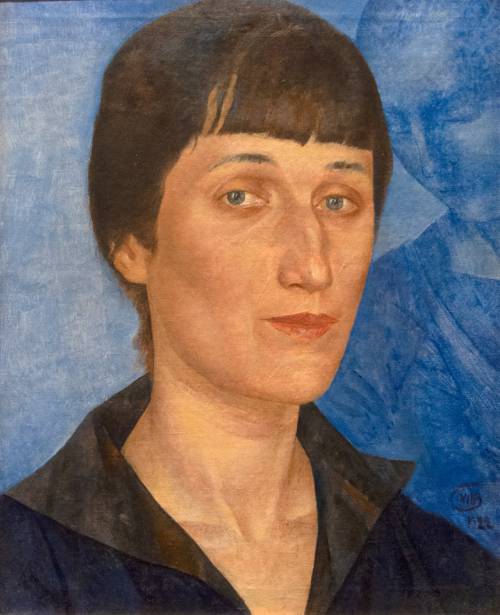
FAQ About Anna Akhmatova

Who was Anna Akhmatova?
Anna Akhmatova was a renowned Russian poet, born in 1889 near Odessa in the Russian Empire. She is widely recognized for her poignant and emotive poetry that spanned significant events in Russian history, including the Russian Revolution and the Stalinist era, which deeply influenced her works. Akhmatova's work is celebrated for its vivid emotional expression and insightful portrayal of the struggles and soul of the Russian people during these times.

What are some of Anna Akhmatova's most famous works?
Some of Anna Akhmatova's most famous works include 'Requiem,' a powerful lament that addresses the Stalinist terror, 'Poem Without a Hero,' an intricate narrative reflecting on her past and Russia's cultural heritage, and 'The White Flock,' a collection of poems showcasing her early lyrical style. Her body of work remains deeply influential in Russian literature and provides insight into the era's social and political challenges.

Why was Anna Akhmatova's poetry considered controversial?
Anna Akhmatova's poetry was considered controversial due to its candid and critical depiction of the oppressive political climate of the Soviet Union, particularly during the Stalinist purges. Her focus on personal and emotional experiences contrasted with the state's preference for socialist realism, which promoted state propaganda through art. As a result, her work was subjected to censorship, and she faced personal scrutiny by the Soviet regime.

How did the Russian Revolution impact Anna Akhmatova's writing?
The Russian Revolution had a profound impact on Anna Akhmatova's writing, shifting her focus from personal and romantic themes to reflecting the societal upheaval and personal tragedies of that era. Her work began to encapsulate the collective suffering and resilience of the Russian people, as demonstrated in later writings which navigated the themes of loss, persecution, and the quest for cultural identity amid chaos.

Did Anna Akhmatova face censorship during the Stalinist regime?
Yes, Anna Akhmatova faced significant censorship during the Stalinist regime. Her works were often banned, and she was portrayed as a symbol of bourgeois culture by Soviet authorities, which led to periods where she was unable to publish her poetry. Despite these challenges, Akhmatova was resilient, continuing to write and preserving her legacy as a pivotal figure in Russian literary history.

How did Stalinist repression influence Akhmatova's poetry?
Stalinist repression deeply influenced Akhmatova's poetry, infusing it with themes of suffering, loss, and endurance. Her personal experiences, including the persecution of her friends and family, were reflected in her poignant and often mournful verses. Poems like 'Requiem' capture the profound grief and despair experienced by many during Stalin's purges, serving as a powerful testament to those dark times.

Was Anna Akhmatova ever honored or recognized during her lifetime?
Despite facing censorship and intermittent publication bans, Anna Akhmatova was honored later in her life. In the 1960s, during the Khrushchev Thaw, her work gained renewed attention, and she received more recognition for her contributions to Russian literature. In 1964, she was awarded an honorary degree from the University of Oxford, acknowledging her impact on the global literary scene.

What themes are prominent in Anna Akhmatova's poetry?
Prominent themes in Anna Akhmatova's poetry include love and passion, personal grief, political oppression, resilience in the face of hardship, and the exploration of identity and cultural heritage. Her ability to weave profound emotional insights with historical and political context allowed her to create works that resonate deeply with readers, both in her homeland and globally.

How did Akhmatova's personal life influence her work?
Akhmatova's personal life greatly influenced her work. Her tumultuous relationships, experiences of loss and persecution, and her struggle with the oppressive Soviet regime deeply shaped her poetry. The arrest of her first husband, the constant surveillance, and her tenuous position in society all served as backdrops to the raw emotional depth found in her poetry, highlighting themes of love, suffering, and resilience.

Where can I find English translations of Anna Akhmatova's poetry?
English translations of Anna Akhmatova's poetry are available in several anthologies. Notable translations include those by D.M. Thomas and Judith Hemschemeyer, which have been praised for maintaining the lyrical and emotional intensity of her original work. Collections such as 'The Complete Poems of Anna Akhmatova' provide comprehensive translations for English-speaking audiences eager to explore her work.

What influenced Anna Akhmatova's poetic style?
Anna Akhmatova's poetic style was influenced by a mixture of personal experiences, Russian culture, and major historical events. She was initially associated with the Acmeist movement, which advocated clarity and precision in poetry. Her exposure to classical literature, Russian folklore, and the dramatic changes in society around her also shaped her distinctive style, characterized by vivid imagery, emotional depth, and an unwavering exploration of human grief and resilience.

How did Anna Akhmatova contribute to the Acmeist movement?
Anna Akhmatova was a prominent figure in the Acmeist movement, which emerged as a response to the Symbolism in Russian poetry. Acmeism, which emphasized clarity, concreteness, and the beauty of the physical world, was exemplified in Akhmatova's early works. Her contributions include using direct language and vivid imagery to focus on personal and emotional experiences, steering Russian poetry away from the abstract and mystical elements of Symbolism.

What were the major challenges Anna Akhmatova faced in her career?
Anna Akhmatova faced numerous challenges in her career, including political persecution, censorship, and personal losses. The Soviet regime often restricted her ability to publish, while state officials marginalized her works as pessimistic and bourgeois. Additionally, her personal life was marred by tragedy, such as the execution of her first husband and the imprisonment of her son, which deeply affected her worldview and artistic expression.

How did Anna Akhmatova manage to preserve her work despite censorship?
Anna Akhmatova managed to preserve her work despite censorship through memorization and oral transmission. During the harshest periods of Stalinist repression, friends and fellow poets memorized her poems to keep them alive. Her efforts to maintain her literary legacy amidst such challenges are a testament to her resilience and dedication to her art and cultural heritage.

What impact did Anna Akhmatova have on Russian literature?
Anna Akhmatova had a profound impact on Russian literature, reshaping the poetic landscape with her emotive and insightful works. Her poetry provided a voice for the silent suffering of the Russian people during tumultuous times, blending personal anguish with broader themes of national identity. She remains a towering figure in Russian cultural history, influencing generations of poets and writers both within Russia and internationally.

Did Anna Akhmatova receive any state honors in Russia?
During her lifetime, Anna Akhmatova did not receive significant state honors from the Russian government, largely due to her contentious relationship with the Soviet authorities who censored her work. However, her legacy has been honored posthumously, and she is widely celebrated as one of Russia's greatest poets.

How did Anna Akhmatova influence other poets?
Anna Akhmatova influenced other poets through her powerful use of language and ability to convey deep emotional truths within the constraints of structured verse. Her resistance to political oppression and commitment to artistic integrity inspired many poets and writers facing their own forms of censorship. Akhmatova's legacy extends to modern poets who look up to her as a beacon of resilience and creative expression.

What was the 'Requiem,' and why is it significant?
'Requiem' is one of Anna Akhmatova's most significant works, a cycle of poems written between 1935 and 1940. It serves as a poignant reflection on the Stalinist purges, capturing the haunting sorrow and despair experienced by countless families who suffered during this period. 'Requiem' is celebrated for its powerful emotional impact, historical importance, and its role in memorializing the silent grief of a generation.

Are there any museums or sites dedicated to Anna Akhmatova?
Yes, the Anna Akhmatova Museum, located in the Fountain House in St. Petersburg, is dedicated to her life and work. The museum preserves her personal belongings, manuscripts, and offers insight into her life within the cultural and historical context of her time. It serves as a space to celebrate and reflect on Akhmatova's enduring literary legacy.

What was Anna Akhmatova's relationship with other Russian literary figures?
Anna Akhmatova had complex relationships with several prominent Russian literary figures. She was close to poets like Osip Mandelstam and Boris Pasternak, sharing mutual respect despite the difficult political climate. Her interactions with these writers often reflected both companionship and the shared struggle of maintaining artistic integrity in the face of political adversity, which greatly influenced Russian literary circles of that era.
